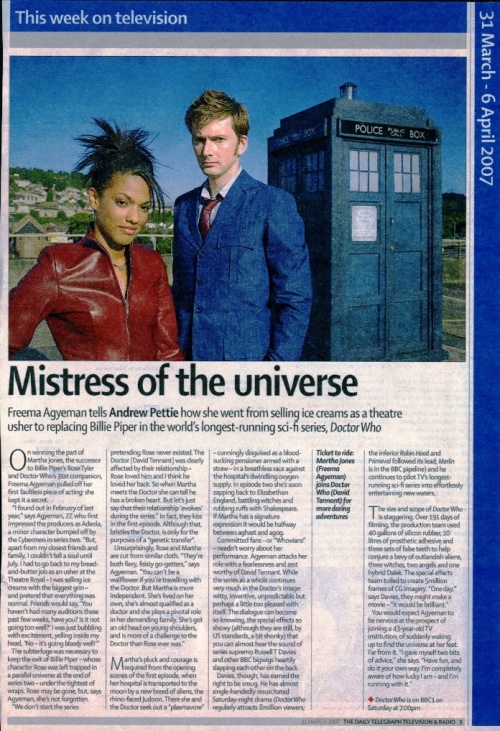Mistress of the universe
- Publication: The Telegraph
- Date: 2007-03-31
- Author: Andrew Pettie
- Page: Television & Radio, p. 3
- Language: English
Freema Agyeman tells Andrew Pettie how she went from selling ice creams as a theatre usher to replacing Billie Piper in the world's longest-running sci-fi series, Doctor Who
On winning the part of Martha Jones, the successor to Billie Piper's Rose Tyler and Doctor Who's 31st companion, Freema Agyeman pulled off her first faultless piece of acting: she kept it a secret.
"I found out in February of last year," says Agyeman, 27 who first impressed the producers as Adeola, a minor character bumped off by the Cybermen in series two. "But, apart from my closest friends and family, I couldn't tell a soul until July. I had to go back to my bread-and-butter job as an usher at the Theatre Royal - I was selling ice creams with the biggest grin and pretend that everything was normal. Friends would say, 'You haven't had many auditions these past few weeks, have you? Is it not going too well?' I was just bubbling with excitement, yelling inside my head, 'No - it's going bloody well!"' The subterfuge was necessary to keep the exit of Billie Piper - whose character Rose was left trapped in a parallel universe at the end of series two - under the tightest of wraps. Rose may be gone, but, says Agyeman, she's not forgotten. "We don't start the series pretending Rose never existed. The Doctor [David Tennant] was clearly affected by their relationship Rose loved him and I think he loved her back. So when Martha meets the Doctor she can tell he has a broken heart. But let's just say that their relationship 'evolves' during the series." In fact, they kiss in the first episode. Although that, bristles the Doctor, is only for the purposes of a "genetic transfer". Unsurprisingly, Rose and Martha are cut from similar cloth. "They're both fiery, feisty go-getters," says Agyeman. "You can't be a wallflower if you're travelling with the Doctor. But Martha is more independent. She's lived on her own, she's almost qualified as a doctor and she plays a pivotal role in her demanding family. She's got an old head on young shoulders, and is more of a challenge to the Doctor than Rose ever was."
Martha's pluck and courage is required from the opening scenes of the first episode, when her hospital is transported to the moon by a new breed of aliens, the rhino-faced Judoon. There she and the Doctor seek out a "plasmavore" - cunningly disguised as a bloodsucking pensioner armed with a strawin a breathless race against the hospital's dwindling oxygen supply. In episode two she's soon zapping back to Elizabethan England, battling witches and rubbing ruffs with Shakespeare. If Martha has a signature expression it would be halfway between aghast and agog. Committed fans - or "Whovians" - needn't worry about her performance. Agyeman attacks her role with a fearlessness and zest worthy of David Tennant. While the series as a whole continues very much in the Doctor's image: witty, inventive, unpredictable but perhaps a little too pleased with itself. The dialogue can become so knowing, the special effects so showy (although they are still, by US standards, a bit shonky) that you can almost hear the sound of series supremo Russell T Davies and other BBC bigwigs heartily slapping each other on the back. Davies, though, has earned the right to be smug. He has almost single-handedly resuscitated Saturday-night drama (Doctor Who regularly attracts 8million viewers; the inferior Robin Hood and Primeval followed its lead; Merlin is in the BBC pipeline) and he continues to pilot TV's longest-running sci-fi series into effortlessly entertaining new waters.
The size and scope of Doc-tor Who is staggering. Over 191 days of filming, the production team used 40 gallons of silicon rubber, 10 litres of prosthetic adhesive and three sets of false teeth to help conjure a bevy of outlandish aliens, three witches, two angels and one hybrid Dalek. The special effects team toiled to create 5million frames of CG imagery. "One day," says Davies, they might make a movie - "it would be brilliant." You would expect Agyeman to be nervous at the prospect of joining a 43-year-old TV institution, of suddenly waking up to find the universe at her feet. Far from it. "I gave myself two bits of advice," she says. "Have fun, and do it your own way. I'm completely aware of how lucky I am - and I'm running with it."
Doctor Who is on BBC1 on Saturday at 7.00pm
Caption: Ticket to ride: Martha Jones (Freema Agyeman) joins Doctor Who (David Tennant) for more daring adventures
Disclaimer: These citations are created on-the-fly using primitive parsing techniques. You should double-check all citations. Send feedback to whovian@cuttingsarchive.org
- APA 6th ed.: Pettie, Andrew (2007-03-31). Mistress of the universe. The Telegraph p. Television & Radio, p. 3.
- MLA 7th ed.: Pettie, Andrew. "Mistress of the universe." The Telegraph [add city] 2007-03-31, Television & Radio, p. 3. Print.
- Chicago 15th ed.: Pettie, Andrew. "Mistress of the universe." The Telegraph, edition, sec., 2007-03-31
- Turabian: Pettie, Andrew. "Mistress of the universe." The Telegraph, 2007-03-31, section, Television & Radio, p. 3 edition.
- Wikipedia (this article): <ref>{{cite news| title=Mistress of the universe | url=http://cuttingsarchive.org/index.php/Mistress_of_the_universe | work=The Telegraph | pages=Television & Radio, p. 3 | date=2007-03-31 | via=Doctor Who Cuttings Archive | accessdate=22 December 2025 }}</ref>
- Wikipedia (this page): <ref>{{cite web | title=Mistress of the universe | url=http://cuttingsarchive.org/index.php/Mistress_of_the_universe | work=Doctor Who Cuttings Archive | accessdate=22 December 2025}}</ref>
